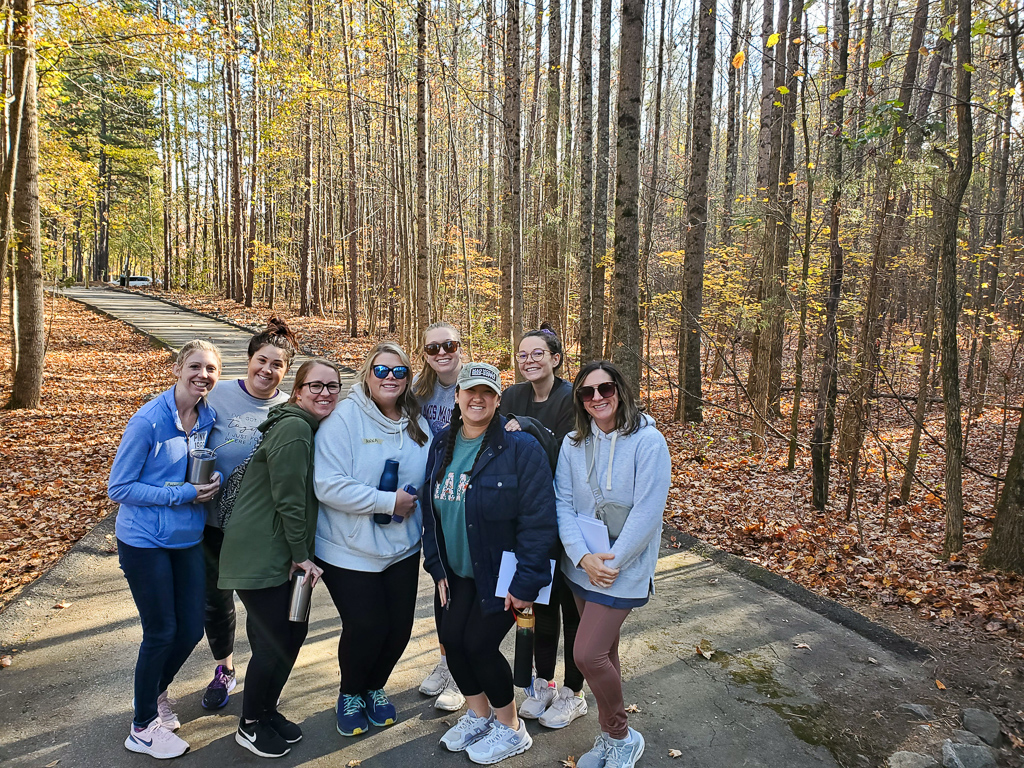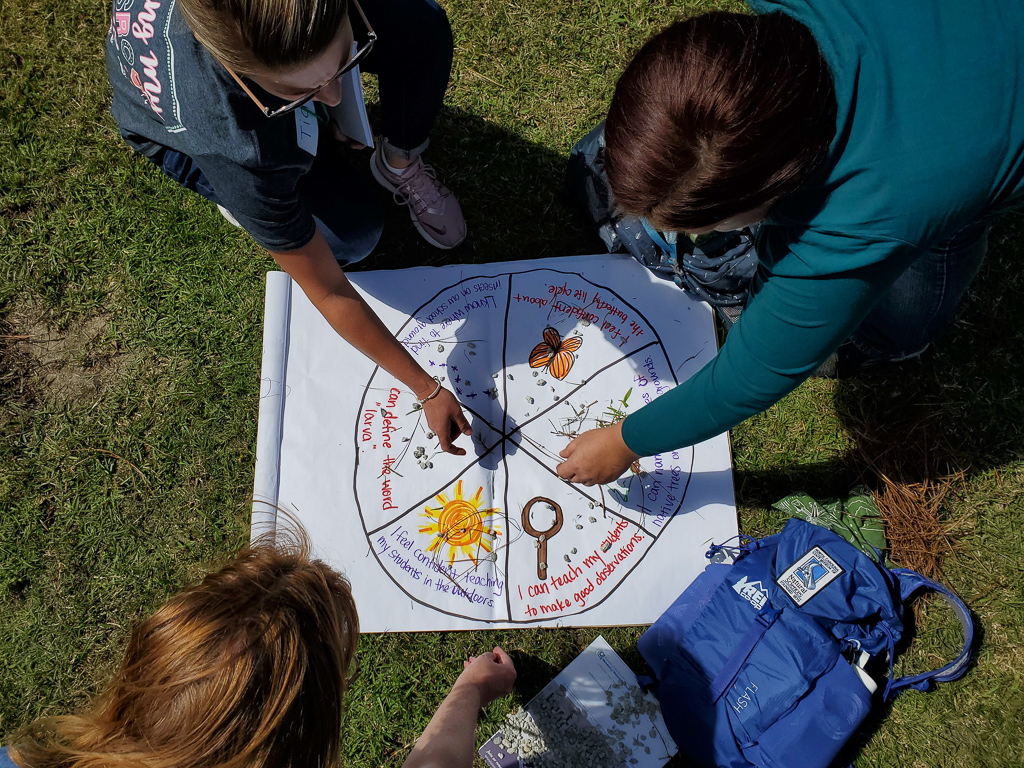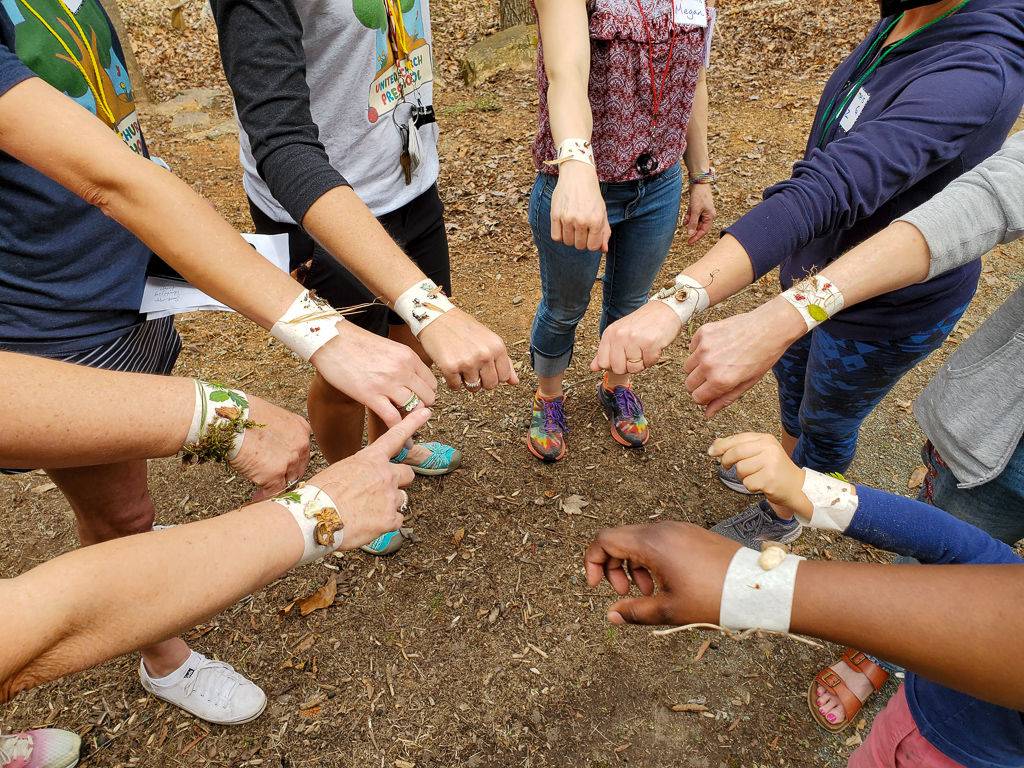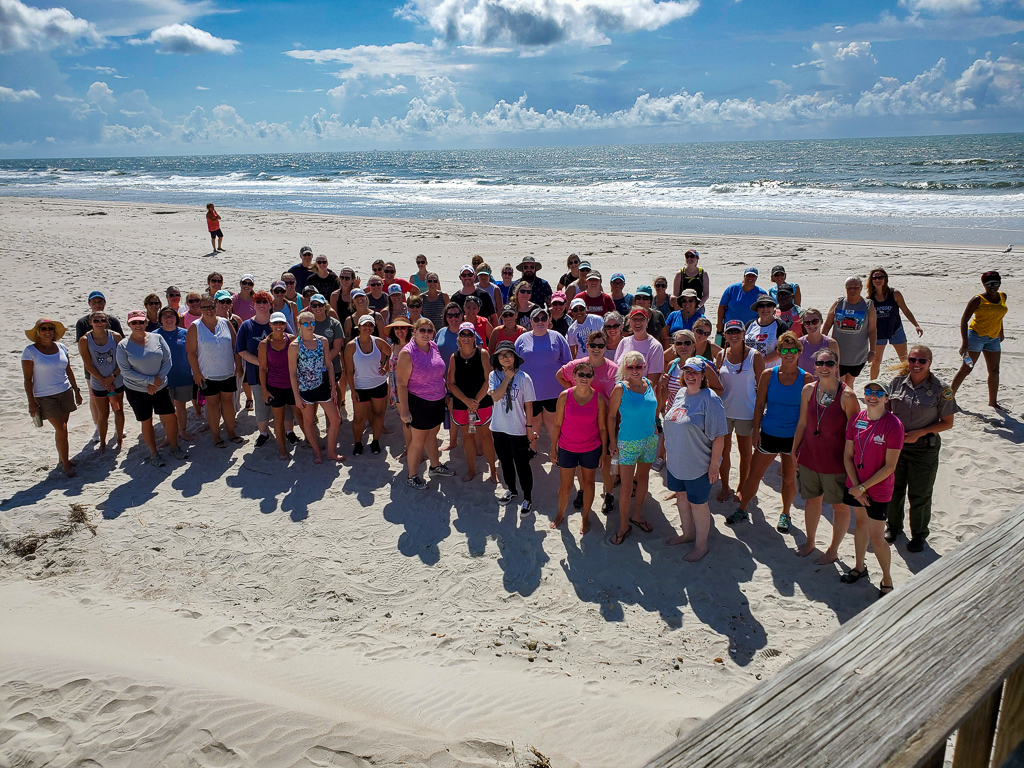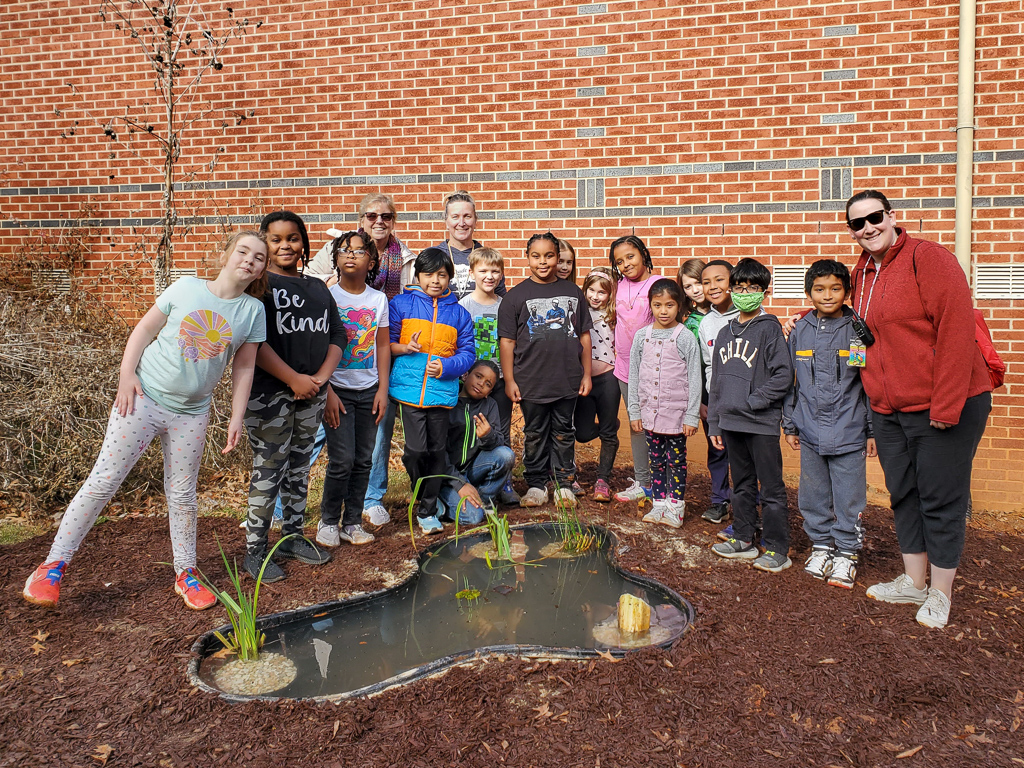School Grounds Workshops
Customized workshops for educators showcasing resources for outdoor learning on your school grounds or other local site.
Through hands-on, outdoor workshops taught by NCMNS staff at your site, educators explore the wonders of nature and increase their comfort in using the outdoors as a teaching resource. Workshops focus on ways you and your students can explore the natural resources right outside your door. We employ observation-based activities, nature journaling, and/or citizen science to discover the wonders of trees, bugs, birds, flowers, animal tracks and signs, ponds and streams, and more. Workshops are customized to your topics of interest, time, and budget.
Who: Groups of up to 24 educators (school faculty, nature center staff or other educator cohorts); minimum of eight. Educators of all grade levels and in any subject area are welcome, as long as they are interested in using the outdoors in their teaching!
When: Any time of year, scheduled at least 6 weeks in advance, and depending on availability. We can provide one workshop or a series of workshops.
Duration: Workshops can be from 2 to 8+ hours in length, depending on your schedule and interests.
Where: We serve the entire state of North Carolina! Workshops can be conducted on your school grounds or at a local natural area anywhere in North Carolina.
Cost: Starting at $100. Workshop fees are used to provide learning materials to support workshop content. Depending on available funding and your interests, we will customize a budget to provide as many resources as possible!
Interested? Fill out our Interest Form and we’ll get in touch within two weeks!
Need a better idea of what we might be able to provide? Check out some examples below…
Workshop Examples
Schoolyard Ecology – all grades
Through hands-on explorations, you’ll become familiar with some of the common species found in your school yard and backyard! From native trees growing at the fence line to arthropods hiding under a rotten log to the weeds growing in the sidewalk cracks – there’s always something to explore. This topic works well as a series of workshops across the school year, allowing us to explore the timing of nature across the seasons.
Building Keen Observers – all grades
It’s easy to forget that observation is a skill that needs to be taught and practiced! In this workshop, you will sharpen your observation skills while learning techniques to do the same for your students. This topic works well alone or at the start of a workshop series.
Nature and Science Journaling – best for grades 3 and up
Recording observations in a nature journal or science notebook makes us notice more about the world around us and helps build a foundation for deeper learning. It’s not about making a pretty picture – a nature journal entry is excellent if we learn something from it. We’ll focus on using drawings, words and numbers to record information in meaningful ways. This topic can be offered as a standalone workshop or seeded across multiple workshops in a series.
Loose Parts Nature Exploration – best for grades Pre-K–2
Learn how to engage the innate curiosity of young children with the wonders of nature. We’ll explore the benefits of using loose parts with young children to facilitate the development of early readiness skills. Activities are centered around natural objects like sticks, stones and pinecones (and so much more!). We may count, stack, make shapes, explore textures and generally practice viewing and manipulating familiar objects from a new perspective through observation, discussion and active engagement.
Students as Scientists – best for grades 4 and up
Learn how you and your students can contribute to scientific research! We’ll explore multiple citizen science projects that may include iNaturalist, eBird, Lost Ladybug, Nature’s Notebook or others. Learn how to collect and report data, and what information is available from other citizen scientists that you and your students can explore.
Habitat Creation – all grades
If, after participating in one or more of our workshops, you discover that you’d like to enhance your schoolyard as a place for wildlife and learning, we can work with you to develop and implement a plan. We can help you and your students create a native plant garden to attract butterflies and other pollinators, a mini-pond for aquatic plants and critters, or work with you on other areas of interest. Note that this will require a bit of sweat equity and preparation, but we can provide advice and some of the materials needed!
UTOTES (Using the Outdoors to Teach Experiential Science) – best for K–5
This long-standing NCMNS program incorporates all of the above topics (except Loose Parts) in six sessions over the course of a school year. Starting with a site visit to meet with a leadership team, we conduct four workshops for staff across the seasons, culminating in the installation of a small habitat project with the help of students.
Examples of Learning Materials Provided
- Class sets of magnifiers and bug boxes.
- Sampling equipment like insect nets or aquatic nets.
- Kid-friendly field guides for common schoolyard species.
- Activity handouts, worksheets and supplemental information (some may be provided digitally).
- Nature-themed storybooks.
- Native plants for gardens/ponds.
- Nature journals for participating educators.
Sample Budgets
These examples are just for reference; actual budget and materials will be based upon your interests, resource availability and your funds.
- $100 — Workshop instruction, digital materials.
Example: Trees. Digital copies of tree-related activities like tree identification, leaf drawing, and tree poetry; digital field guides to “Common Schoolyard Trees and Common Forest Trees of North Carolina.” - $400 — Above materials, plus class sets of magnifiers and bug boxes (36 of each).
- $800 — Above materials, plus field guides and equipment for 1-2 topics (5 copies of student field guides, 1 copy of reference field guides, simple sampling gear like nets.)
Example: Invertebrates. Five sweep nets, 1 aerial net, 5 white sheets/tablecloths, 5 “Golden Guides to Insects,” “5 Golden Guides to Spiders,” 1 “Field Guide to North American Insects.” - $1100 — Above materials, plus field guides and equipment for second and/or third topic.
Example: Birds. Bluebird box and poles, bird feeder, 5 copies of “Peterson First Guide to Birds,” 1 copy of “Peterson Birds of Eastern North America,” 5 plush birds that play calls, children’s book about birds, bird identification posters. - $1400 — Above materials, plus field guides and equipment for a third and/or fourth topic.
Example: Pond exploration and flowers. Five sets of sampling gear (nets, pans, trays, etc.), 5 “Golden Guides to Pond Critters,” 5 “Guides to Life in Vernal Pools,” 1 “Field Guide to the Reptiles and Amphibians of the Carolinas and Virginia,” 5 “Golden Guides to Weeds,” 1 “Newcomb’s Field Guide to Wildflowers,” flowers for dissection at workshop. - $2000 — Above materials plus supplies for a discrete habitat installation (does not include large or difficult-to-transport items like topsoil, mulch or construction materials; we advise on construction materials, but these types of items need to be supplied by the school either through donations or purchases made locally).
Example: Minipond. Pre-formed pond liner, aquatic plants, pots, mosquito dunks, thermometer, dechlorinator; school provides site prep, mulch and flat stones for edging (optional but recommended). - $2000+ — With larger budgets, we can consider bigger-ticket items like a class set of binoculars (~$4000), a class set of ground chairs (~$1200), and individual materials for each participant (varies based on number of participants and types of materials desired).


